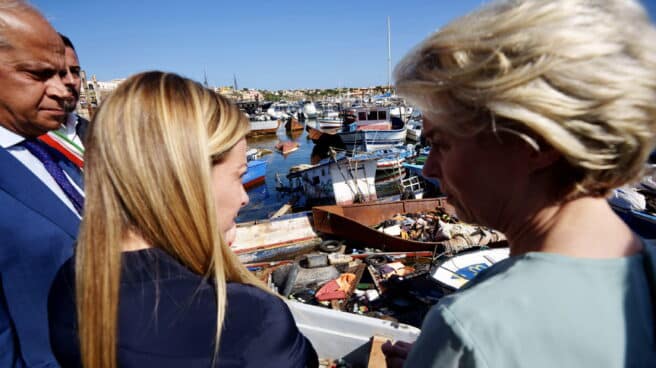

Meloni and von der Leyen in Lampedusa.
President of the European Commission, Ursula von der LeieItalian Prime Minister Giorgia Meloni visited this Sunday the island of Lampedusa, one of the busiest migrant arrival points in the Mediterranean, and announced an “action plan” to help Italy, which includes, among other things, measures to speed up deportations. migrants not entitled to asylum.
The third of the ten points of the action plan envisages “increasing impact by adopting a new and coordinated approach between the main countries of origin of new arrivals, that is, Guinea, Côte d’Ivoire, Senegal and Burkina Faso, to improve cooperation and facilitate readmission,” it said. Europa Press.
It also specified “increasing support to Frontex through training and improving tools to ensure returns are processed quickly.”
The plan also includes “strengthening support” for Italy from the European Union Asylum Agency and the European Border and Coast Guard (Frontex) to “cope with large numbers of migrants” and “ensure registration” of those who arrive. information and redirection to the “appropriate authorities”.
“Let’s stop illegal departures”
Von der Leyen presented the plan in Lampedusa, accompanied by Italian Prime Minister Giorgia Meloni, who said “the future of Europe is at stake.” For this reason, he advocates the need to “re-execute the second and third phases” of the naval mission of Operation Sophia.
In addition, Meloni recalled that the Council of Ministers, scheduled for this Monday, will discuss the rule “to extend the period of detention for the purpose of repatriation of those who arrive in Italy illegally to the maximum allowed by European rules.” “The Ministry of Defense will immediately take measures to create the necessary structures,” he explained.
Regarding strategy, Meloni stated that “we will never solve the problem by talking about redistribution.” “The only way to take the problem seriously is to stop illegal travel,” he stressed.
For her part, Von der Leyen emphasized the importance of her visit to Lampedusa. “Illegal immigration is a European problem that requires a European response,” he said. “We will decide who gets to Europe, not human traffickers,” he emphasized.
“The traffickers are unscrupulous people who make billions by putting people on boats with lies: they put them in danger just to make money,” he said.
“This is why it is necessary to explain in countries of origin that if you choose traffickers, you may lose your money. If they come legally, we will welcome them,” he assured.
Unaccompanied minors
In particular, the ten-point plan concerns the island of Lampedusa and thus envisages “supporting the movement of people from Lampedusa” to other countries through a voluntary solidarity mechanism “with special attention to unaccompanied minors and women.”
It also includes “strengthening maritime and air surveillance” through Frontex and aims to “expand naval missions in the Mediterranean.” He also plans to prevent the use of dangerous ships to cross the Mediterranean Sea and destroy those used to cross the Mediterranean Sea.
The strategy also emphasizes the importance of “departure avoidance” from countries of origin by promoting rapprochement with their governments and combating human trafficking mafias in these countries as well as in transit territories. The plan specifically mentions Tunisia due to its proximity to Lampedusa.
The plan thus proposes “information and communication campaigns to discourage crossings of the Mediterranean Sea” and in parallel proposes “alternatives such as entry for humanitarian reasons and by legal means.”
To this end, von der Leyen announced the upcoming visit of Margaritis Schinas to African countries in her capacity as Vice-President of the European Commission and Commissioner for the Promotion of the European Way of Life to achieve their cooperation.
Boat “cemetery”
In particular, Meloni and von der Leyen visited the “graveyard” of boats on which migrants reached the island. Lampedusa deputy mayor Attilio Lucia warned it was an “ecological bomb” that was also preventing fishermen from going out fishing. Meloni promised that the beach would be cleared in four to five days.
The two leaders were also able to speak with Red Cross volunteers and visit the Immigration Reception Center in Lampedusa for about ten minutes.
Save the Children stressed that von der Leyen and Meloni’s visit to Lampedusa was an “important signal” but they stressed the need to protect their human rights.
“These are the most vulnerable people, especially unaccompanied minors, very young children, survivors of gender-based violence, torture and inhuman and degrading treatment.” “Now they are paying the price for years of lack of coordinated policies among European Union member states,” laments the NGO.
Source: El Independiente